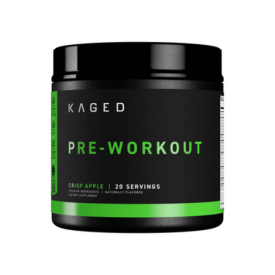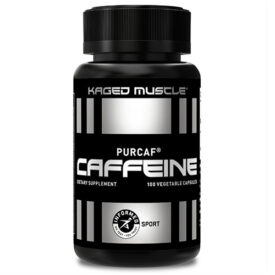How you prepare for a training session can be just as important as the actual work you put in, in the gym. To get the most out of your time in the iron paradise, pre-workout supplements are the way to go. Or rather, caffeine is the way to go, as your power output increases after ingesting a pre-workout that contains the stimulant. (1)
Caffeine provides stimulatory benefits that extend the time it takes to fatigue. Pre-workout with a central nervous system (CNS) stimulant (read: caffeine) can help users knock out more reps in upper body and lower body exercises (i.e., bench press or leg press) before reaching failure. (2) So that begs the question: how much caffeine do you need to get your best workout?

Editor’s note: The content on BarBend is meant to be informative in nature, but it should not be taken as medical advice. The opinions and articles on this site are not intended for use as diagnosis, prevention, and/or treatment of health problems. It’s always a good idea to talk to your doctor before beginning a new fitness, nutritional, and/or supplement routine.
[Related: The Ultimate Workout Split to Build Strength and Muscle Mass]
What Does Caffeine Do to the Body?
Before diving into the suggested type and amount of caffeine to take to improve training sessions, let’s break down what caffeine is.
Caffeine is a psychoactive substance, meaning it “affects how the brain works and causes changes in mood, awareness, thoughts, feelings, or behavior,” according to the National Cancer Institute. That said, there are some benefits to how caffeine affects the CNS. Namely, increased energy expenditure, improved cognitive skills — such as perception of alertness and wakefulness — and a lower risk of developing neurodegenerative diseases (i.e., Alzheimer’s). (3)(4)
There are some potential downsides to taking caffeine. For one, caffeine can negatively impact one’s sleep if taken six hours before bedtime. There’s also a potential risk of increased anxiety and/or depression, particularly when taken in higher doses — more than 1,000 milligrams per week (equal to 10 cups of coffee), according to the U.S. Dept. of Agriculture (USDA). (5)(6)
How Does Caffeine Work?
Caffeine is an antagonist to the A1 and A2a adenosine receptors — two of the four adenosine receptors in the body. The A1 and A2a receptors regulate the heart’s oxygen consumption and blood flow and mediate the physiological actions of adenosine, a nucleoside that occurs naturally for general metabolism. (7)(8)(9) Being an antagonist to these receptors means caffeine positively modifies the force of contraction in muscles and increases heart rate.
Dosage for Training
There is no exact proper dosage of caffeine for everyone as training and dietary needs vary from athlete to athlete. However, as a baseline, a randomized control trial in the Journal of Sports Medicine and Physical Fitness found that those who consumed five milligrams of caffeine per kilogram of body weight minus one kilogram increased their repetition output on the bench press by 11.6 percent versus those who didn’t. (10)
[Read More: The Best Upper Body Exercises and Workouts]
Additionally, those who consumed caffeine increased their repetition output by over 19 percent versus those who trained caffeine-less. Caffeine showed the “most pronounced performance-enhancing effects on movement velocity.” (11)
Note: Caffeine can be harmful in high doses, so it’s suggested to start with a small dose if you’re new to taking it, and increase the amount you ingest slowly over time. And always consult with a doctor before taking a new supplement like caffeine.
Performance Benefits of Caffeine
Caffeine is unlikely to affect maximal strength. However, there are several primary benefits to consuming caffeine prior to training. The most notable are increased endurance, improved confidence, and better agility.
Increased Endurance
If you’re aiming to PR a squat or deadlift, caffeine will not help you move the last few pounds to get there. What it will do, however, is “enhance endurance and resistance to fatigue,” according to a review in Sports Medicine. (12) On higher volume training days, caffeine could help you lift that extra set, those additional final reps, or even make an every-minute-on-the-minute (EMOM) workout a bit more manageable.
Mental Gains
Caffeine’s effect on your mindset at the gym is also notable. Not only has caffeine been shown to increase endurance and power output, but it can also improve confidence for approximately two to four hours after ingestion. (13)(14) These effects of caffeine appear to increase with dose. People who consumed 600 milligrams* of caffeine showed improvements in sustained attention and reaction time for up to eight hours versus up to four hours for those who ingested 150 milligrams.
*Note: A dose this high may produce increases in tension or anxiety and was implemented for purposes of the study.
Increased Agility
If you are competing in functional fitness competitions, such as CrossFit®, caffeine might prove to be fruitful when it comes to jumping, running, sprinting, and agility-based workouts. A meta-analysis of 34 studies published over a decade and a half (2001-2018) in Research in Sports Medicine found that caffeine “increased single and repeated jump height, single and repeated sprint velocity, and reduced the time to complete agility tests.” (15)
If, for example, your training involves box jumps, jumping rope, high-intensity interval training (HIIT), or rowing, caffeine is likely to improve your performance if consumed beforehand. Even wall balls and high-rep barbell workouts are likely to improve via caffeine intake.
Kaged Muscle Pre-Kaged®
In addition to the 25 milligrams of Vitamin B6 and 500 micrograms of Vitamin B12, Kaged Muscle Pre-Kaged® contains 274 milligrams of organic caffeine in its Neuro-Focus Matrix. That matrix also includes two grams of Taurine and 850 micrograms of L-Tyrosine.

This pre-workout supplement comes in a 20-serving tub and provides L-Citrulline, L-Leucine, and L-Valine, to name a few, per 20-calorie scoop. There are seven flavors available including Grape, Fruit Punch, and Crisp Apple.
That dose of caffeine is the same as nearly three eight-ounce cups of coffee. Considering this is a pre-workout with that much caffeine alongside 6.5 grams of L-Citrulline and three grams of L-Leucine, this is a product to reach for before resistance training.
Kaged Muscle Purcaf® Caffeine
For gym-goers and athletes looking for a more straightforward caffeine supplement, Kaged Muscle Purcaf® Caffeine is just that. One bottle contains 100 veggie capsules that each contain 200 milligrams of caffeine extracted from green coffee beans — equivalent to just over two eight-ounce cups of coffee.

This pure organic caffeine supplement contains 100 vegetable capsules per bottle. Each single-capsule serving provides 200 milligrams of caffeine — equivalent to approximately two cups of coffee.
The Caffeine Dream
Consuming caffeine before a training session is likely to make you feel more confident as you hit higher reps. The dosage needed will vary based on an individual’s needs, tolerance levels, and training goals. Still, even small doses offer potential benefits not privy to those who skip the caffeine altogether. So enjoy your favorite caffeine-packed pre-workout before steeping in the squat rack and reap the gains.
References
- Nic Martinez, et al. The effect of acute pre-workout supplementation on power and strength performance. 2016. Journal of the International Society of Sports Nutrition. doi: 10.1186/s12970-016-0138-7.
- Jordan J Outlaw, et al. Acute effects of a commercially-available pre-workout supplement on markers of training: a double-blind study. 2014. Journal of the International Society of Sports Nutrition. doi: 10.1186/s12970-014-0040-0.
- Simone Cappelletti, et al. Caffeine: Cognitive and Physical Performance Enhancer or Psychoactive Drug? 2015. Current Neuropharmacology. doi: 10.2174/1570159X13666141210215655.
- Eynav Harpaz, et al. The effect of caffeine on energy balance. 2017. Journal of Basic and Clinical Physiology and Pharmacology.
- Christopher Drake, et al. Caffeine Effects on Sleep Taken 0, 3, or 6 Hours before Going to Bed. 2013. Journal of Clinical Sleep Medicine. doi: 10.5664/jcsm.3170.
- Gareth Richards, Andrew Smith. Caffeine consumption and self-assessed stress, anxiety, and depression in secondary school children. 2015. Journal of Psychopharmacology. doi: 10.1177/0269881115612404.
- A Nehlig, et al. Caffeine and the central nervous system: mechanisms of action, biochemical, metabolic and psychostimulant effects. 1992. Brain Research. Brain Research Reviews. doi: 10.1016/0165-0173(92)90012-b.
- Frances O’Callaghan, et al. Effects of caffeine on sleep quality and daytime functioning. 2018. Risk Management and Healthcare Policy. doi: 10.2147/RMHP.S156404.
- Singh S, McKintosh R. Adenosine. [Updated 2021 Jul 13]. In: StatPearls [Internet]. Treasure Island (FL): StatPearls Publishing; 2021 Jan-. Available from: https://www.ncbi.nlm.nih.gov/books/NBK519049/
- Da Silva VL, Messias FR, Zanchi NE, Gerlinger-Romero F, Duncan MJ, Guimarães-Ferreira L. Effects of acute caffeine ingestion on resistance training performance and perceptual responses during repeated sets to failure. J Sports Med Phys Fitness. 2015 May;55(5):383-9. PMID: 26068323.
- Raya-González J, Rendo-Urteaga T, Domínguez R, Castillo D, Rodríguez-Fernández A, Grgic J. Acute Effects of Caffeine Supplementation on Movement Velocity in Resistance Exercise: A Systematic Review and Meta-analysis. Sports Med. 2020 Apr;50(4):717-729. doi: 10.1007/s40279-019-01211-9. PMID: 31643020.
- T E Graham. Caffeine and exercise: metabolism, endurance, and performance. 2001. Sports Medicine. doi: 10.2165/00007256-200131110-00002.
- Grgic J, Trexler ET, Lazinica B, Pedisic Z. Effects of caffeine intake on muscle strength and power: a systematic review and meta-analysis. J Int Soc Sports Nutr. 2018;15:11. Published 2018 Mar 5. doi:10.1186/s12970-018-0216-0
- Institute of Medicine (US) Committee on Military Nutrition Research; Marriott BM, editor. Food Components to Enhance Performance: An Evaluation of Potential Performance-Enhancing Food Components for Operational Rations. Washington (DC): National Academies Press (US); 1994. 20, Effects of Caffeine on Cognitive Performance, Mood, and Alertness in Sleep-Deprived Humans. Available from: https://www.ncbi.nlm.nih.gov/books/NBK209050/
- Salinero JJ, Lara B, Del Coso J. Effects of acute ingestion of caffeine on team sports performance: a systematic review and meta-analysis. Res Sports Med. 2019 Apr-Jun;27(2):238-256. doi: 10.1080/15438627.2018.1552146. Epub 2018 Dec 5. PMID: 30518253.

